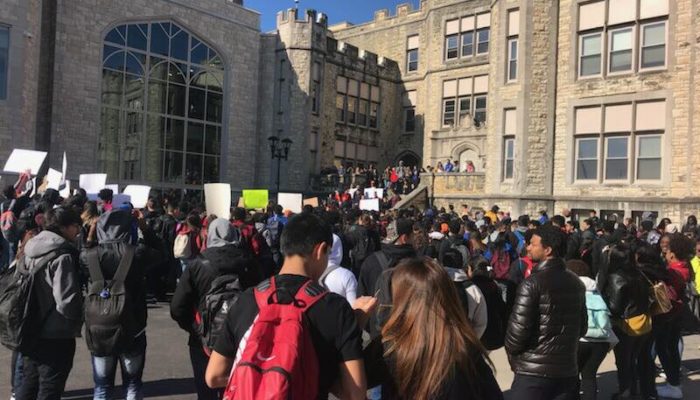
Let the Kids Lead
Last week, as I was getting my hair cut, the stylist next to me was cutting the hair of a middle-aged man and was saying, “I don’t know, though. We have to listen to these kids. It seems like they’re fed up, and I don’t blame them.”
I was a little surprised to hear this in the salon, a typically apolitical place, but everyone everywhere has an opinion about guns in schools now, it seems.
The man responded, “Oh, please. They’re kids. Did you know that the average teenager in today’s society can’t even name the last three presidents? I tried talking to my teenage niece about Johnny Carson the other day and she had no idea who I was even talking about! They just don’t know anything.”
I raised an eyebrow and glanced at my stylist – a woman I’ve known for over a decade – in the mirror. She rolled her eyes slightly. I muttered, sarcastically and perhaps a little too loudly, “Yes, because not knowing who a dead celebrity is definitely means kids can’t talk intelligently about their safety.”
As a high school teacher, I have these conversations more often than I’d like. It’s a popular sentiment to disparage Millenials and their younger Gen Z counterparts. They are, after all, upending everything we thought we knew about the American Dream, consumerism, and social norms, and change is difficult, especially for the older crowd. But, even though I deal with common issues like kids sneaking text messages in the middle of a lesson or listening to loud music with their headphones in the hallways, I recognize that my students are uniquely qualified to talk intelligently and passionately about issues that concern them, and at this moment in history, that includes school safety.
Student anger especially makes adults uncomfortable. It is often raw and emotional; it lacks the finesse and thoughtfulness we gain with age and experience. It is also often reactionary and sometimes spontaneous, making it unpredictable. As such, adults often scramble to find ways to shut that anger down before it can boil over. Sometimes, this can be a good thing; when their anger comes from an emotional reaction, it can take adult intervention to teach them a more productive way of dealing with their emotions. I would argue, though, that while the anger and frustration of the survivors of the Parkland shooting – as well as their counterparts walking out of schools and staging protests across the nation – seems purely reactionary, it is, in fact, the result of an entire lifetime of lockdown drills, false alarms, and intense news coverage of mass shooting after mass shooting coupled with their leaders’ predictable and frustrating inaction.
In the wake of these student protests, I have seen many responses from teachers and administrators ranging from complete support to doubling down on questionably legal punishments. Most often, adults who do not support this student movement are either trying to redirect the attention away from the students – as was the case with the ad hominem attack the man next to me at the salon employed – or redirect the students toward other ways to channel (or, more likely, stifle) their anger, such as programs that are more preferable – from an adult perspective – to the walkouts.
I would argue that ignoring and redirecting student anger is a mistake. There is a huge historical precedent for effective student protests, from the marches and boycotts of the Civil Rights movement demanding equality for all races, to the East LA walkouts during which Latinx students protested against unfair treatment in the Los Angeles Unified School District high schools, to the protests against the Vietnam War – and these are just some of the most famous in the United States. These protests were all incredibly effective; after student protesters were killed at Kent State University during a protest of the Vietnam War, for example, students showed solidarity and shutdown 450 campuses nationwide, and incensed over 4 million student protesters. Every one of these protests resulted in significant changes in policy, both locally and nationally.
If we can agree that something needs to change regarding guns and gun culture in this country, and polls show that the majority of Americans believe this to be true, we need to let the students lead the way. Not only have these kids had an entire lifetime to think and get angry about how ridiculous it is that they should have to fear for their lives when entering a school building, they also have access to a wider knowledge base about amplifying messages and maintaining this momentum than adults ever will. This is their movement and their time, and just as they need to sit with their anger and let it direct their action, adults need to sit with their discomfort about that anger and either step aside or get on board.
Well said/written, Ashley. Nice to actually read a respectable & thoughtful adult response to this. Thank you.
<3 Thank you.